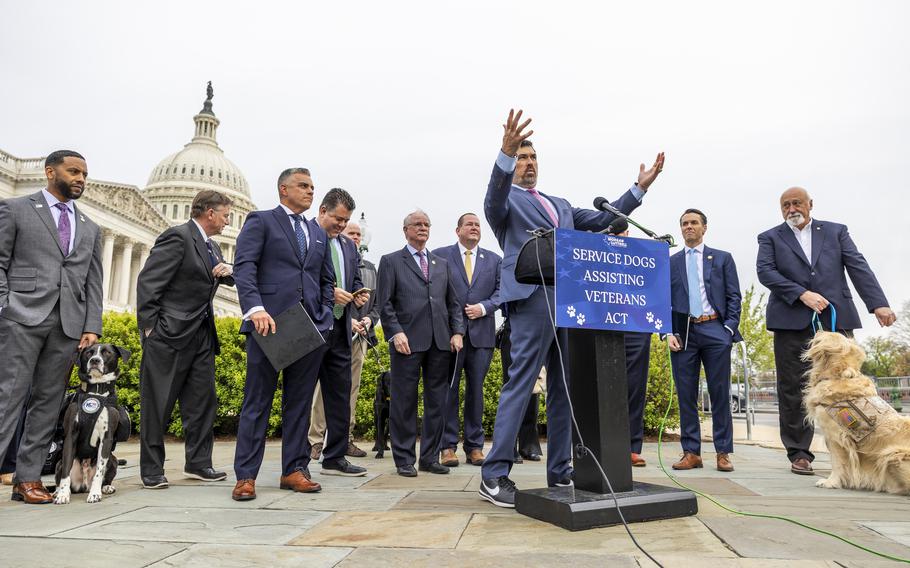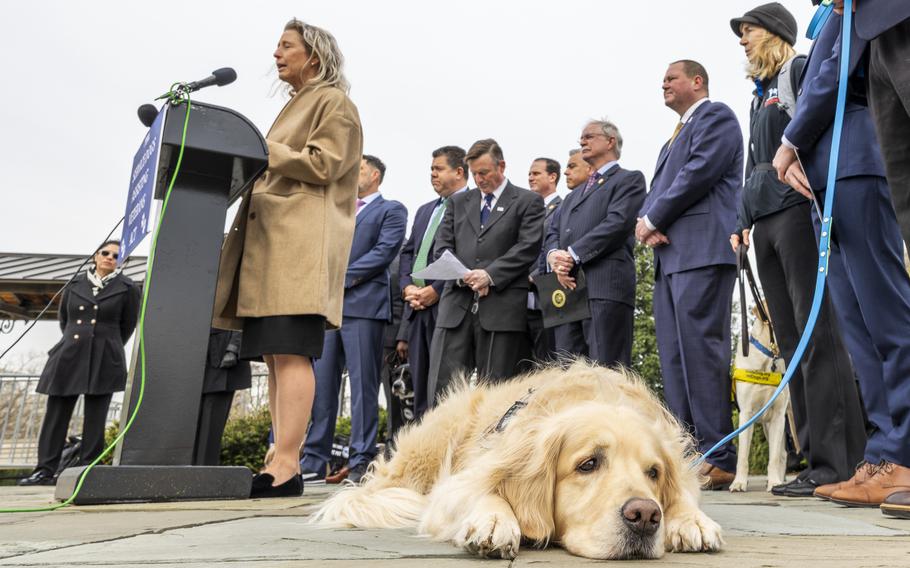
Rep. Morgan Luttrell, R-Texas, speaks during a news conference on Wednesday, April 2, 2024, on Capitol Hill in Washington, to announce the Service Dogs Assisting Veterans Act, which would require the Department of Veterans Affairs to award grants to nonprofits that provide service dogs to veterans at no cost. (Eric Kayne/Stars and Stripes)
WASHINGTON — Army veteran Bob Ouellette and Cooper, a 9-year-old golden retriever, were outside the Capitol on Wednesday to support a bill that would fund $10 million annually for grants to provide service dogs to veterans with post-traumatic stress disorder and traumatic brain injuries.
The bill — called the Service Dogs Assisting Veterans Act or SAVES Act — would authorize the Department of Veterans Affairs for the first time to award grants to nonprofits to provide service dogs at no cost to veterans with disabilities.
Ouellette works with Warrior Canine Connection, a Maryland nonprofit that breeds, trains and pairs service dogs with eligible veterans. But he also attended the event as an advocate for his son, an Army veteran with PTSD and TBI who relies on a service dog to assist with his daily interactions that include attending classes at the University of Maryland.
“When my son first came home after tours in Iraq and Afghanistan, he would stay up in his room — not engage or talk with anyone. But when he got his dog, he became sociable and would talk with us,” said Ouellette about his son, Rusty Ouellette, a former sergeant medically retired from the military.
The SAVES Act was reintroduced in the House on Wednesday after failing to advance to a final vote in fiscal 2024. Under the new legislation, it also will fund grants to train service dogs for veterans with hearing loss, blindness, paralysis and health conditions from military sexual trauma.
“The [VA] secretary shall award grants, on a competitive basis, to nonprofit organizations to assist such organizations in carrying out programs to provide service dogs to eligible veterans,” according to the legislation.
A companion bill is expected to be introduced next month in the Senate, according to the office of Rep. Morgan Luttrell, R-Texas, who is leading the House bill. He was joined at the news conference by about a dozen lawmakers from both political parties, as well as veterans and service dog organizations.
“This legislation is about giving our heroes the tools they need to thrive — not just survive — when they come home,” said Luttrell, a former Navy SEAL and chairman of the House Veterans’ Affairs Committee’s subpanel on disability assistance and memorial affairs.
More than 450,000 returning service members have been diagnosed with traumatic brain injuries in the past 20 years, according to the VA. Serious head injuries place veterans at greater risk for unemployment, homelessness, substance abuse and suicide.
Disabled American Veterans, the Elizabeth Dole Foundation, the Iraq and Afghanistan Veterans of America and Semper K9 Assistance Dogs are among more than two dozen nonprofits that have endorsed the bill.
Luttrell and other speakers at the news conference said they believe the SAVES Act will help ease suicide risks among veterans and help them better manage the pressures of transitioning to civilian life. Having a service dog gives veterans a sense of purpose that they might lack after leaving the military, Luttrell said.

Cooper, a golden retriever from the nonprofit Warrior Canine Connection, rests Wednesday, April 2, 2024, during a news conference on Capitol Hill in Washington, to announce the Service Dogs Assisting Veterans Act, which would award grants to nonprofits that provide service dogs to veterans at no cost. (Eric Kayne/Stars and Stripes)
“As a member of the Veterans’ Affairs Committee and proud grandson of veterans, I know we need to do more to help our veterans address both the visible and invisible wounds of war,” said Rep. Morgan McGarvey, D-Ky. “These brave men and women put on the uniform to defend our freedom, and we have a moral obligation to support them.”
“Our veterans have sacrificed so much for our country, and we owe it to them to provide every possible resource to support their recovery and well-being,” Luttrell said.
But training an assistance dog costs on average about $50,000, according to nonprofits that breed, train and pair dogs with veterans.
The SAVES Act would establish a five-year, $50 million VA-administered grant program for eligible nonprofit organizations. It would enable the organizations to provide trained service dogs to qualifying disabled veterans at no cost. Organizations now depend on donations to fund operations.
The legislation will ultimately put more service dogs in the hands of veterans “with visible and invisible disabilities,” said Bill McCabe, vice president of government and external affairs at K9s for Warriors, which provides specially trained service dogs to disabled veterans who’ve experienced a brain injury, PTSD and military sexual trauma.
Under the legislation, qualifying nonprofits would have to meet standards established by an accreditation organization with protocols for training assistance animals.
Rusty Ouellette, 36, obtained his service dog through Warrior Canine Connection after his medical discharge, his father said. He served for a dozen years.
But Warrior Canine Connection added a purpose to his son’s life post-military, said the elder Ouellette, who also served in the Army for 17 years that included tours in Europe. He retired in 1998.
At the news conference, he was joined by Cooper, trained as a service dog for Warrior Canine Connection. The two work together at public events, Ouellette said. The dog was bred and trained by the organization, which has kept him as its ambassador.
Grants to nonprofits such as Warrior Canine Connection would help pay for staff, which include one-on-one care and training for the dogs, vet bills and operating the facilities where the dogs are raised, Ouellette said.
Warrior Canine Connection has a “puppy cam” on its website to help engage users and draw interest to its mission. The organization breeds service dogs for their temperament and ability to work with their human companions, he said.
“Cooper goes out with me and meets people,” Ouellette said. “He is part of the team. In public, people see the dog first. They respect service dogs and have this warm response. For many veterans, having this bond gives them back their lives.”